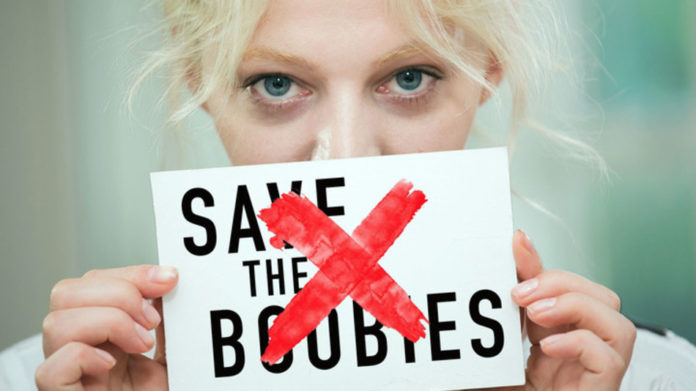#NoBraDay forgets that women are more than their boobies

Let’s talk about boobs.
Do I have your attention? Well, that’s actually part of the problem.
Tuesday is #NoBraDay, a social media campaign encouraging women to go braless for one day to help raise awareness for breast cancer. The momentary hashtag, though seemingly well-intentioned, has been on the receiving end of criticism — and it deserves it.
Along with proud participants posting no-bra selfies, various social media users have sounded off on the hashtag, calling out the campaign for missing the mark.
Aside from doing little to educate or raise funds for meaningful breast cancer research, they argue the campaign spreads a concerning message — that breasts, and breasts alone, are what’s worth attention.
How does #NoBraDay ensure people actually take preventative measures like yearly mammograms?
It doesn’t. Stop sexualizing breast cancer.
— Sasha Gilthorpe (@sgilthorpe) October 13, 2015
“It’s offensive,” Jean Sachs, CEO of Living Beyond Breast Cancer, tells Mashable. “I mean, breast cancer is a life-threatening illness. It has nothing to do with wearing a bra or not wearing a bra.“
But it’s not only #NoBraDay that sends this message. This day reflects a long line of efforts putting breasts at the forefront of the cancer conversation. Cheeky slogans such as “Save the Boobies,” “Save Second Base” and “Declare Our Love for Boobies” have been a cornerstone of breast cancer rhetoric for years.
Under the guise of empowering women who are living through breast cancer, this framing of the conversation fragments women, suggesting their breasts are worth more concern than their lives.
In the end, we are encouraged to save the breasts, not the woman.
A photo posted by Elizabeth Plank (@feministabulous) on
But in a society that sexualizes women’s bodies relentlessly, this message isn’t entirely surprising.
“Breast cancer is an easy cause to sexy up because it’s about breasts,” Gayle Sulik, founder and executive director of the Breast Cancer Consortium, tells Mashable. “We don’t see this kind of stuff with any other disease.”
By having a laser focus on “boobies” as worth saving, we lose the entirety of the woman in the conversation. Her worth is defined by her body, as is her experience with cancer. The impact cancer has had on her as a whole — emotionally, mentally and physically — is largely ignored in favor of a more enticing dialogue.
“We pay attention, but not really,” Sulik says. “We do a double-take when we see ‘boobies.’ But we don’t really pay attention to what’s going on with breast cancer. That’s a hugely damaging impact of this sort of message.“
But breasts aren’t entirely irrelevant, and it would be a disservice to women who have experienced mastectomies to say that they are. For women living with breast cancer (and women in general), their breasts often do hold significance — and losing them can be devastating. Those feelings of loss are worth acknowledging as real and pertinent to the conversation.
However, breasts aren’t the only things impacted by cancer. They aren’t the only part of the conversation. The boobies are worth saving — but so is the entire woman.
“These campaigns are not helpful in getting people to understand what’s really going on when a woman is diagnosed,” Sachs says. “It’s not about second base anymore. It’s about living to see your kids grow up. It’s about reaching your next milestone.”
It’s time to change the conversation.
Have something to add to this story? Share it in the comments.
